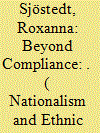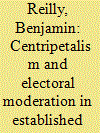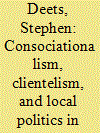| Srl | Item |
| 1 |
ID:
159906


|
|
|
|
|
| Summary/Abstract |
Implementation of minority rights norms is an important step for integration. The ultimate aim of norm diffusion is internalization, that is, when a norm is being taken for granted. This article seeks to develop an understanding of socialization beyond formal compliance and suggests that material and ideational structures at both the elite and societal levels mutually reinforce one another. The framework is applied to the case of the integration of the Russian minority in Estonia, 1991–2016. The concepts of recognition and solidarity help to theorize and explain this socialization process and the constraints of both materialist and identity dimensions.
|
|
|
|
|
|
|
|
|
|
|
|
|
|
|
|
| 2 |
ID:
159908


|
|
|
|
|
| Summary/Abstract |
Centripetal approaches to ethnic conflict management seek to promote inter-ethnic accommodation and moderation by making politicians dependent on the electoral support of groups other than their own base. There is an ongoing debate about the utility of such approaches, including which kinds of electoral systems can best promote moderate and centrist politics in deeply divided societies. Neglected in this debate, however, has been the experience of ethnically diverse established democracies utilizing centripetal electoral models. This article examines historical evidence from Australia, and recent natural experiments with subnational electoral reform in the United States, which lend support to centripetal claims that preferential, “ranked choice” or “instant runoff” voting can encourage electoral moderation and address political polarization.
|
|
|
|
|
|
|
|
|
|
|
|
|
|
|
|
| 3 |
ID:
159905


|
|
|
|
|
| Summary/Abstract |
Both liberal and corporatist consociational systems are often characterized by identity-based networks that rely on clientelism and are difficult to hold accountable. This article uses Beirut's 2015 garbage crisis and 2016 municipal elections to argue that cities can be important sites for building new civic networks because cities often have resources and frames that can be used to mobilize individuals in different ethnosectarian networks. These civic networks, by promoting ideas of citizenship and state accountability, can be a significant factor in increasing liberalism in consociational systems.
|
|
|
|
|
|
|
|
|
|
|
|
|
|
|
|
| 4 |
ID:
159909


|
|
|
|
|
| Summary/Abstract |
In 1917, the United States was far from a cohesive entity. Using the events surrounding World War One as a natural laboratory to trace the construction of a unified American identity, this article adds to the debate on the political sociology of identity frames and nationalism. Using an event-frame - model to analyze the discourse reflected in pamphlets disseminated by the Wilson administration, I demonstrate how identity frames evolved and increasingly relied on enemy images to strengthen the in-group coherence of American citizens. Thus, paying attention to the political dynamics of frame evolution is crucial in understanding the emergence of salient identities.
|
|
|
|
|
|
|
|
|
|
|
|
|
|
|
|
| 5 |
ID:
159907


|
|
|
|
|
| Summary/Abstract |
This article asks why, in contrast to other historic territories with a regional language, such as Catalonia and the Basque Country, nationalist parties in the Autonomous Community of Galicia receive less electoral support. Going beyond prior explanations of this counterintuitive political outcome, which were mainly based on economic, sociological, and institutional factors, this piece of research sheds light on the strategies of political parties. It examines not only nationalist forces but statewide ones that successfully compete in Galicia. Our analysis is focused on the Bloque Nacionalista Galego (BNG) because this is the only nationalist force that has consistently achieved representation within the regional Parliament. Along with BNG's translation into party positions in both the left-right and center-periphery dimensions, the article's main contribution is its updating of the BNG's three framing strategies: the nationalism/“Spanishism” (1982–1993), the “common project” discourse (1993–2005), and the sovereigntist one (2005 onward). Shifts in public opinion regarding the territorial model and other attitudes toward self-government are also examined.
|
|
|
|
|
|
|
|
|
|
|
|
|
|
|
|